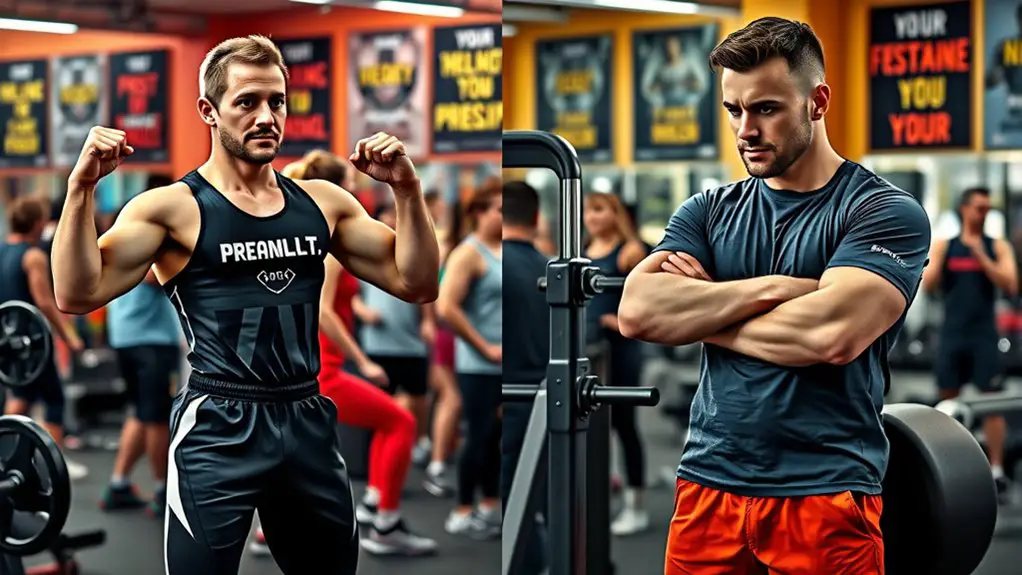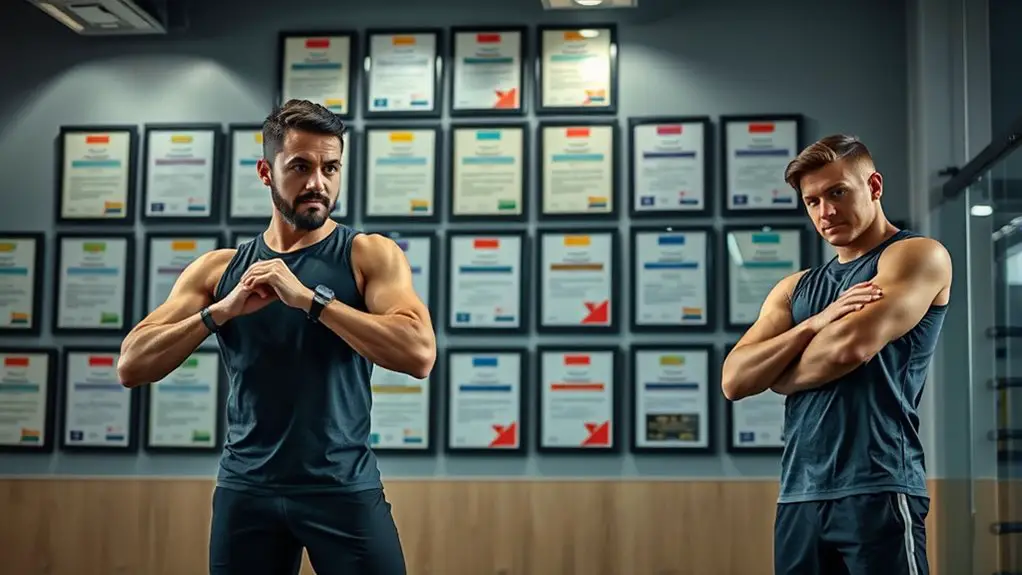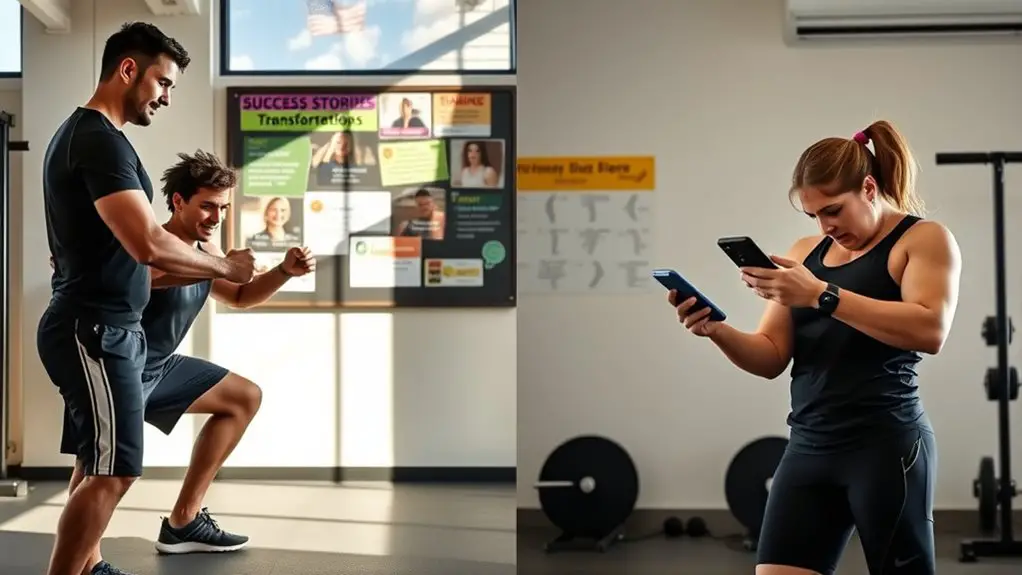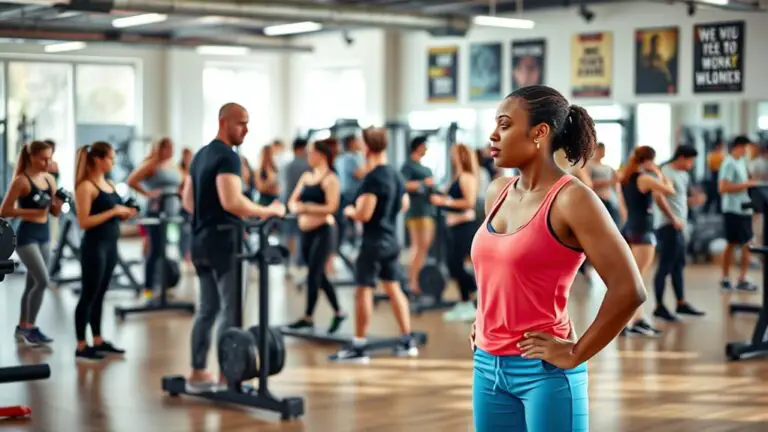The Best Ways to Identify a Good vs. Bad Gym Trainer

To identify a good gym trainer, start by checking their qualifications and certifications. Look for experience and expertise that align with your goals. Effective communication and professionalism are key—make sure they listen and respect your needs. A good trainer customizes programs to fit you and tracks progress with regular feedback. Finally, impressive client success stories can reveal a trainer’s impact. Want to know more about what makes a great trainer? Keep exploring the details!
Qualifications and Certifications

When you’re looking for a gym trainer, it’s essential to evaluate their qualifications and certifications, as these credentials often reflect their knowledge and expertise. Start by checking the certification validity—ensure the trainer holds a reputable certification from a recognized organization. This shows they’ve completed the necessary trainer education and understand the principles of fitness, anatomy, and nutrition. Look for certifications that require ongoing education, as this indicates the trainer stays updated on industry trends and best practices.
Don’t hesitate to ask about their educational background. A solid foundation in kinesiology, exercise science, or a related field can enhance a trainer’s ability to create effective, personalized programs. By prioritizing these qualifications, you’ll increase your chances of finding a knowledgeable trainer who can guide you safely and effectively toward your fitness goals. Remember, a qualified trainer can make all the difference in your fitness journey.
Experience and Specialization
While qualifications and certifications lay the groundwork for a good gym trainer, experience and specialization are what truly shape their effectiveness. You want someone who not only understands fitness theory but also has the real-world experience to back it up. A trainer with a diverse training background can adapt their approach to suit your unique needs.
Consider these factors when evaluating a trainer’s experience and specialization:
- Years of coaching experience in different environments
- Specific expertise in areas like strength training, weight loss, or rehabilitation
- Proven track record with clients who have similar goals to yours
- Participation in ongoing education to stay updated on fitness trends
- Testimonials or reviews from previous clients
Communication Skills

When it comes to choosing a gym trainer, their communication skills can make all the difference. A good trainer not only delivers clear instructions but also excels at active listening, ensuring they understand your needs and concerns. This combination fosters a supportive environment where you can thrive and achieve your fitness goals.
Active Listening Ability
Active listening is essential in the relationship between a gym trainer and their client, as it fosters trust and understanding. A trainer who employs effective listening techniques can better address your needs and concerns. Look for these signs of active listening in your trainer:
- Maintains eye contact to show engagement
- Paraphrases your concerns to confirm understanding
- Asks follow-up questions to explore deeper into your goals
- Demonstrates empathy through supportive responses, a key aspect of empathy training
- Provides feedback that reflects your input and progress
When trainers prioritize active listening, they create a more tailored and effective training experience. This ability not only enhances communication but also strengthens the trainer-client bond, leading to better results.
Clear Instruction Delivery
Effective communication is essential for a successful training experience, as clear instruction delivery helps you understand and execute exercises correctly. A good trainer should possess strong instructional clarity, breaking down complex movements into simple, digestible steps. They’ll guarantee you grasp the purpose behind each exercise, enhancing your overall effectiveness.
Effective demonstrations are equally important; your trainer should model each movement, allowing you to visualize proper form and technique. This not only boosts your confidence but also minimizes the risk of injury. If your trainer frequently checks in to confirm your understanding and adjusts their explanations based on your feedback, you’re likely in good hands. Clear communication fosters trust, guaranteeing you achieve your fitness goals safely and efficiently.
Attention to Individual Needs
A great gym trainer recognizes that no two clients are alike, tailoring their approach to meet each individual’s unique needs and goals. By focusing on personalized programs and thorough client assessments, they guarantee you’re on the right path to success. Here’s what to look for:
A skilled gym trainer customizes their methods to fit each client’s unique journey, ensuring tailored support for success.
- Initial Assessment: A good trainer will evaluate your fitness level, health history, and specific goals.
- Custom Programs: They’ll design a workout plan that’s tailored to your abilities and aspirations.
- Ongoing Adjustments: Your trainer should regularly update your program based on progress and feedback.
- Support and Motivation: They provide encouragement and adapt their training methods to keep you engaged.
- Holistic Approach: A strong focus on nutrition, recovery, and mental well-being complements your physical training.
Finding a trainer who pays attention to your individual needs can make all the difference in your fitness journey.
Training Philosophy and Style

How does a trainer’s philosophy and style impact your fitness experience? A trainer’s approach can greatly shape your journey, influencing your motivation and results. Their training methods and motivational techniques should align with your goals, ensuring a supportive environment.
| Training Philosophy | Common Methods | Motivational Techniques |
|---|---|---|
| Holistic Approach | Functional Training | Goal Setting |
| Bodybuilding Focus | High-Intensity Interval | Positive Reinforcement |
| Wellness-Oriented | Strength and Conditioning | Visualization and Affirmations |
When selecting a trainer, consider how their training style resonates with you. Do they focus on just lifting weights, or do they incorporate mindset coaching? A good trainer will inspire you to push through barriers while keeping your unique needs in mind. Ultimately, the right philosophy and style can make all the difference in your fitness journey. Additionally, a trainer should be aware of knee arthritis implications when designing your workout plan to ensure your safety and well-being.
Professionalism and Ethics
While choosing a gym trainer, professionalism and ethics are essential factors that can considerably affect your experience and progress. A trainer who embodies these qualities not only enhances your workout but also fosters a trusting relationship. Here are some signs of strong professionalism and ethical practices:
Choosing a gym trainer with professionalism and ethics is crucial for a positive and effective fitness journey.
- Clear Communication: They explain workouts, goals, and progress openly.
- Respect for Boundaries: They honor your comfort levels and privacy.
- Trainer Accountability: They take responsibility for your training, adapting as needed.
- Transparent Pricing: They provide clear information on fees and packages without hidden costs.
- Commitment to Safety: They prioritize your well-being by ensuring proper form and technique.
Client Testimonials and Success Stories

When selecting a gym trainer, client testimonials and success stories can provide invaluable insights into their effectiveness and approach. You should pay attention to client feedback, as it often highlights the trainer’s ability to motivate and customize programs based on individual needs. Success metrics, such as weight loss or strength gains, can indicate how well a trainer has guided their clients toward achieving goals.
Here’s a quick table to help you assess client experiences:
| Success Metrics | Client Feedback |
|---|---|
| Weight Loss | “Lost 15 pounds in 3 months!” |
| Strength Gains | “Increased my squat by 50%!” |
| Endurance Boost | “Ran my first 5K!” |
| Confidence Growth | “I feel stronger than ever!” |
Frequently Asked Questions
How Do I Know if a Trainer Is Genuinely Interested in My Progress?
To know if a trainer’s genuinely interested in your progress, look for consistent progress tracking and personalized feedback. If they’re regularly checking your metrics, adapting workouts to your needs, and providing constructive criticism, it shows they care. When they ask about your goals and celebrate your achievements, that’s a positive sign. Remember, a good trainer invests time in understanding you and your journey, ensuring you feel supported and motivated along the way.
What Questions Should I Ask a Potential Trainer During an Interview?
When you interview a potential trainer, ask about their training philosophy to gauge their approach to fitness. Inquire how they tailor programs to individual needs and goals. Also, request client testimonials to see real-life success stories. These insights can help you understand their effectiveness and commitment to client progress. Don’t hesitate to ask about their experience with similar goals to yours; it’ll give you a clearer picture of their capabilities.
How Often Should I Expect My Trainer to Update My Workout Plan?
Think of your workout plan like a garden—it needs regular care and attention to flourish. You should expect your trainer to update your workout plan every 4 to 6 weeks, allowing for workout progression and plan customization. This keeps things fresh and aligned with your goals while preventing plateaus. Regular updates guarantee your training evolves as you do, making your fitness journey both effective and exciting. So, don’t hesitate to ask for those tweaks!
Are There Red Flags to Watch Out for During a Trial Session?
During a trial session, keep an eye out for certain signs that might indicate a trainer’s suitability. If the trainer’s behavior seems disorganized or overly focused on personal gains rather than your progress, that’s a red flag. Also, they should be attentive, not just watching you struggle without guidance. If they fail to explain exercises or correct your form, it’s worth reconsidering whether they’re the right fit for your fitness journey.
Can a Trainer Work With Clients Who Have Specific Medical Conditions?
Yes, a trainer can work with clients who have specific medical conditions, but it’s essential they possess the right medical expertise. You’ll want to make certain they understand your needs and can design personalized training programs tailored to your condition. Always communicate openly about your health, and don’t hesitate to ask the trainer about their experience with similar cases. A knowledgeable trainer can help you achieve your fitness goals safely and effectively.





